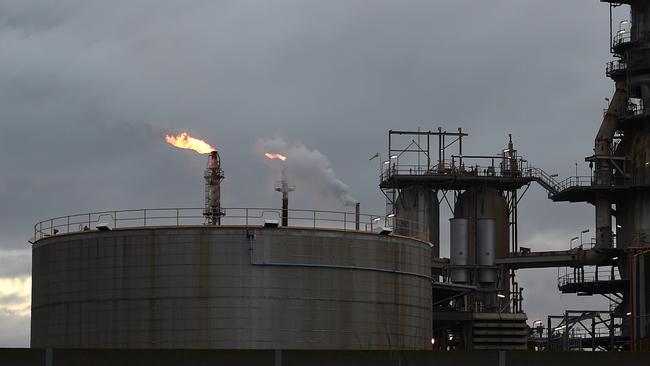Refinery rescue bill costs $2.35bn
Taxpayers will underwrite the operations of the nation’s two remaining oil refineries and upgrade their operations to produce cleaner fuel.

Taxpayers will underwrite the operations of the nation’s two remaining oil refineries and upgrade their operations to produce cleaner fuel under a $2.35bn rescue package to ensure Australia maintains a sovereign fuel production capability.
The funding, which was included but not disclosed in last week’s federal budget, will provide Ampol’s Lytton refinery in Brisbane and Viva’s Geelong facility with variable payments to meet earnings shortfalls, to the value of $2bn to 2030.
The refineries will be given a further $302m to bring forward a scheduled improvement in fuel standards from 2027 to 2024, which refiners had warned would send them bankrupt.
The new direct payment system replaces a planned market mechanism funded by motorists at the bowser.
The government was desperate to prevent the closure of the nation’s final two refineries, which have been battered by the COVID crisis, after ExxonMobil’s announcement in February that it would close its Altona refinery, and BP’s decision last year to cease production at Kwinana in Perth.
Scott Morrison said the investment would ensure Australia maintained the ability to produce its own fuel in a crisis, while protecting jobs and avoiding higher prices for motorists.
“This is a key plank of our plan to secure Australia’s recovery from the pandemic, and to prepare against any future crises,” the Prime Minister said.
“Shoring up our fuel security means protecting 1250 jobs, giving certainty to key industries, and bolstering our national security.”
He said the shift to better quality fuels, with ultra-low sulphur levels, would also improve air quality — delivering an estimated $1bn in lower health costs — and give Australian consumers greater choice in new cars.
Ampol and Viva are yet to guarantee they will remain in Australia, but the package was designed in collaboration with both companies.
Ampol said last week it was awaiting “the detail and the certainty of the government support initiatives” before it decided on the Lytton plant’s future.
The variable Fuel Security Service Payment increases when refineries’ margins are low and tapers off when profits are high, hitting $2.04bn by 2030 under a worst-case scenario.
“This will mean that the refineries are only supported in down times and will not receive government support when they are performing well,” Energy Minister Angus Taylor said.
The government will introduce a new Fuel Security Bill to parliament in coming weeks to implement the new payment system from July 1.
It will also bring forward an industry-wide review of petrol and diesel standards to 2022, to create Euro-6 equivalent standards for Australia.
“The government will work with both refineries on their plans to consider future fuel technologies and other development opportunities,” Mr Taylor said. “This will include the refineries’ roles in the rollout of future fuels, such as electric vehicle charging and hydrogen transport infrastructure.”
Viva employs 700 workers in Geelong, while Ampol has 550 workers at its Lytton facility.




To join the conversation, please log in. Don't have an account? Register
Join the conversation, you are commenting as Logout